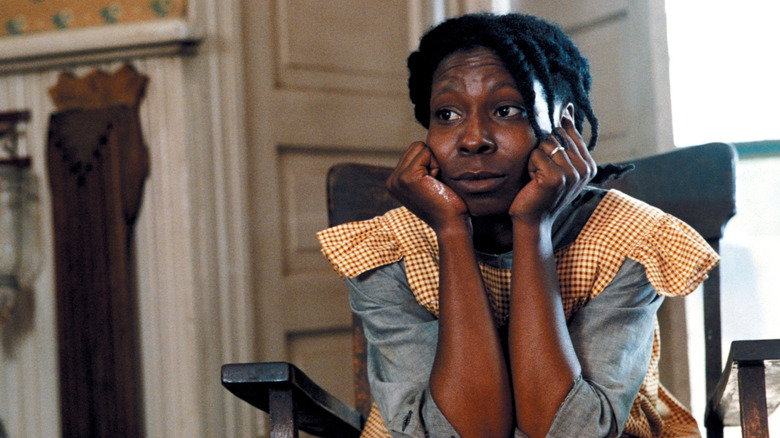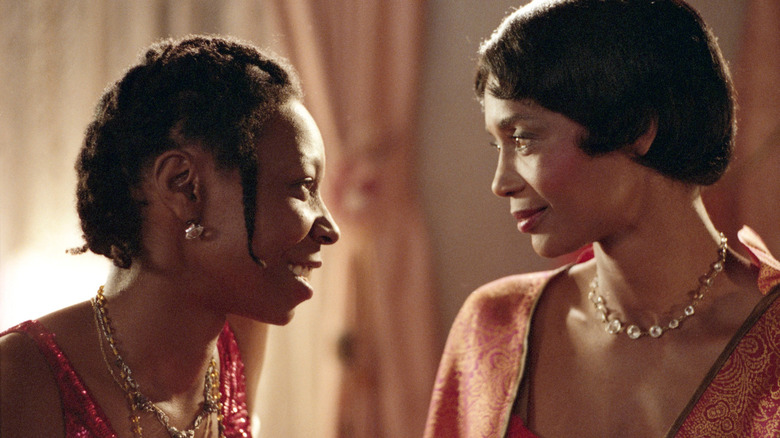Why Director Steven Spielberg Got A Lot Of Criticism For The Color Purple
You know that feeling of watching someone ice skate for the first time? Or when a little kid finally tries riding their bicycle without training wheels? That's sort of the feeling I get watching Steven Spielberg's movie adaptation of "The Color Purple."
Make no mistake: Spielberg's 1985 film version of Alice Walker's 1982 Pulitzer Prize-winning novel of the same name, which he directed from a script by his eventual "Indiana Jones and the Last Crusade" co-writer Menno Meyjes, is quite lovely to look at; it's a Spielberg picture so that much goes without saying. Whoopi Goldberg is similarly splendid as the grown-up Celie Harris-Johnson, a queer Black woman living in early 20th-century Georgia who endures horrific abuse at the hands of the men in her life yet finds kindness, support, and love from the Black women around her (and not just platonic love, either — more on that to come).
It's not that Spielberg had never tackled a "serious" adult movie before that, either. He'd done that as far back as his second feature film (and the first he made specifically for a theatrical release), 1974's "The Sugarland Express," and even his early blockbusters "Jaws" and "Close Encounters of the Third Kind" offset their awe-inspiring action and spectacle with grounded drama. It's also clear that Stevie Boy saw "The Color Purple" as his answer to his idol John Ford's "The Grapes of Wrath," which was a fine approach to take to translating Walker's unvarnished portrayal of historical life among rural Black Southerners to the big screen.
Be that as it may, "The Color Purple" doesn't feel like the handiwork of a director with an entirely firm grip on the steering wheel. Perhaps it was because, on some level, Spielberg was aware that this wasn't exactly his story to tell.
Spielberg was criticized by Black directors for The Color Purple
The history of who has gotten to tell which stories, and how they've told them, in Hollywood is long enough to fill (and no doubt has filled) several books. To this day, marginalized filmmakers — which encompasses anyone who isn't a white, straight, cisgender man — still aren't afforded equal opportunities to tell stories about either themselves or anything else for that matter. This isn't something that people have only just started talking about in the 21st century either. As Spielberg told Entertainment Weekly in 2011, this was a widely discussed issue when he made "The Color Purple" (and long before that too):
"Most of the criticism came from directors that felt that we had overlooked them and that it should have been a Black director telling a Black story. That was the main criticism.[...]"
It's worth remembering these Black directors were (justifiably) arguing that Spielberg shouldn't be the one to helm the film, and not, per se, that he couldn't do an okay job. Just watching "The Color Purple," though, Spielberg's direction doesn't come across as all that assured or confident to me. His instinct seems to be handling the dark subject matter (domestic abuse, misogynoir, racism) like he's making an old-school Disney animated melodrama, which clashes tonally with the moments that he plays in a rawer and grittier fashion.
Not that I'm saying anything new. "The other criticism was that I had softened the book. I have always copped to that," Spielberg told EW, arguing that Walker was often present during filming and "could have always stepped forward to say, 'You know, this is too Disney. This is not the way I envisioned the scene going down.'" We'll unpack that in a moment, but first, let's talk about one particular element that Spielberg admitted he did get wrong.
Spielberg has admitted he didn't get Shug and Celie's romance right
Were you surprised to see "The Color Purple" on /Film's list of the greatest queer movies you didn't realize were queer? A lot of people didn't understand Celie's connection with the singer Shug Avery (Margaret Avery) was meant to be romantic when the film first came out, and even to this day, people struggle to fully grasp the implications of the scene where the two gently lock lips. Where Walker's novel makes the pair's relationship explicitly sexual, Spielberg admitted he "didn't feel [he] could get a [PG-13] rating" like he wanted if he followed suit. He added:
"And I was shy about it. In that sense, perhaps I was the wrong director to acquit some of the more sexually honest encounters between Shug and Celie because I did soften those. I basically took something that was extremely erotic and very intentional, and I reduced it to a simple kiss. I got a lot of criticism for that."
Walker may have not voiced her concerns about moments like this during filming, but I suspect that's only because she'd already accepted that this was the only way her book was even going to be adapted at all (to mention nothing of the power dynamic between a Black woman and a venerated white filmmaker 40 years ago). As for Spielberg, "The Color Purple" emboldened him to continue taking on darker and more challenging stories without softening them, paving the way for his arguably underrated "Empire of the Sun" and his most powerful work on "Schindler's List" and "Munich."
"The Color Purple," for better or worse, walked (and, more often than not, stumbled along) so those films could run.


